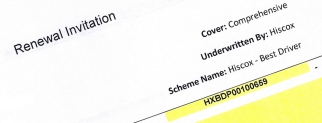New
disclosure rules for insurance renewals
For further information
on the new FCA conduct of business rules introduced recently which come into force
from 1st April 2017.
Freshfields
Bruckhaus Deringer
Bond
Dickinson
The introduction of these new FCA requirements was mentioned
in a report to the Club's Council meeting on Saturday 11th March 2017 by Peter
Best.
For the avoidance of doubt, no part of this NEWS item is formal
advice with regard to motor insurance, simply a report of a development due to
come into force in a matter of a few weeks as it is surprising it has not received
much news coverage.
Posted:
170312 |  | A
mandatory change affecting insurance comes into effect from 1st April 2017. From
that date all insurers, and presumably brokers too, have to include in communications
to their customers concerning the renewal of their insurance cover a statement
explaining customers should shop around to ensure they get the best deal.
| The
Financial Conduct Authority (FCA), the conduct regulator which covers the
insurance sector, has been concerned that the way in which insurance policies
are priced at renewal may result in poor customer outcomes. Customers may not
understand the price they are paying for their renewed policy, and longstanding
customers may pay more than new customers for the same product due to this lack
of understanding and their inertia when it comes to shopping around at the point
of renewal. In December 2015 the FCA published a consultation on new rules and
guidance to tackle these issues. Their policy statement contains new rules that
will be added to the Insurance: Conduct of Business source book (ICOBS) from 1st
April 2017.
Notice to be issued with insurance renewals
Firms
proposing to consumer the renewal of cover are now required to encourage consumers
to consider shopping around for alternative cover. The firm must provide the information
set out below to the consumer in good time before the renewal of the policy.
Presentation
of new premium
The firm must provide the proposed premium to be paid on
renewal in good time before the renewal of the policy.
Presentation
of historic premium information
The firm must also provide either:
>
the premium paid by the consumer at the start of the policy; or
> where
one or more mid-term changes were made to the policy which the firm proposes to
renew, an amount calculated by annualising (or otherwise adjusting as appropriate
to the duration of the proposed policy) the premium in effect following the most
recent mid-term change, excluding all fees or charges associated with those mid-term
changes.
Comparison
invitation
The customer must also be provided with a statement
>
inviting them to check that the level to be provided by the cover is appropriate
for their needs, and
> reminding them that they can compare prices and
levels of cover offered by alternative product providers.
Comment
The
aim here is to ensure the customer will be aware of the historic premium information
so they can compare that with the renewal premium on the papers they receive from
the insurer or broker and see the extent of any increase or decrease in the premium
payable.
During an item on a BBC R4 programme this week it was said that
in the energy market the regulator wants to introduce measures to try and make
all energy suppliers offer their cheapest tariffs to all customers and not just
to new customers (to attract them) or to existing customers who contact their
existing supplier and seriously haggle for a better rate. Analysis suggests the
loyal customers who do not search
for better tariffs are paying higher energy prices and it is that increase in
their energy price which is subsidising the discounts offered to new or churning
or haggling customers. Clearly that business model regards loyal customers as
"stuffees"! It seems the motive behind the insurance "renewal statement"
in the new FCA rules above for the insurance sector is based on a similar concerns.
Classic
car insurance is specialised sector of the motor insurance market where the scope
and quality of the policy is important rather than simply price. Limited mileage
and agreed value conditions help reduce the premium payable but other features
of the scope of the policy are important with classic car policies - free European
cover, breakdown cover in the UK and in Europe and factors like how well the insurer
or broker handle claims. Hopefully that experience will be rare if at all but
when you need support with a claim then the quality of the support will become
a very important feature in the policy. Multi-car policy features are also a feature
too where both your daily driver car(s) and your classic car(s) are either covered
by one policy or covered by some other beneficial multi-car cover arrangement.
On
renewing a classic car insurance cover it's well worth making sure the type
of use you put the car to is covered. Many insurers exclude commuting for
instance and competitive use as well, although low-key events may be covered by
some policies. |
|




